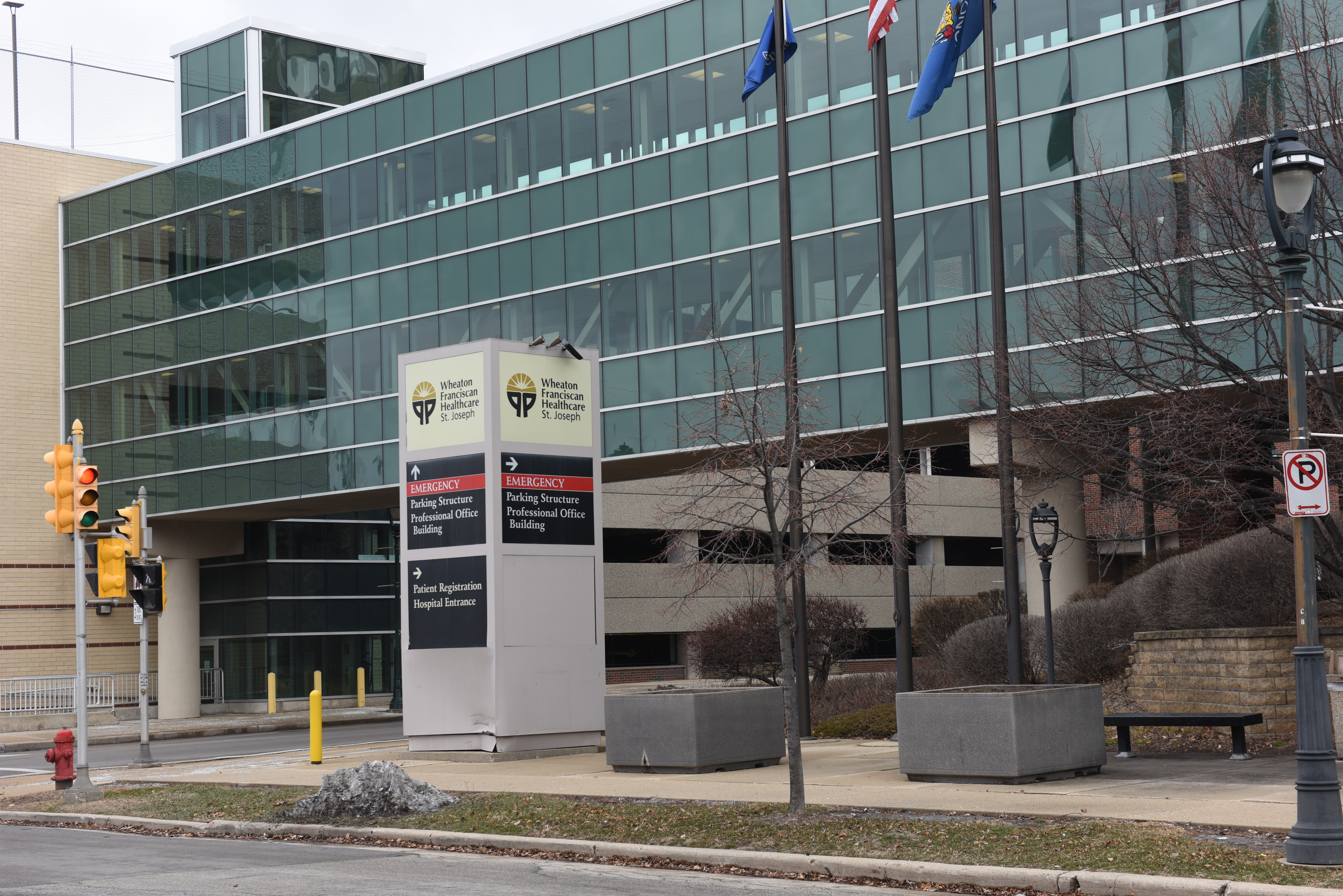
The Wheaton Franciscan nuns who founded St. Joseph Hospital moved it from
North 4th Street and West Reservoir Avenue to Sherman Park in 1930 when they needed more space. (Photo by Sue Vliet)
Mention St. Joseph Hospital, and you are bound to hear grumblings from some residents who are upset about changes.
Since St. Michael’s Hospital closed in 2006, St. Joe’s is the only hospital serving the predominately African-American neighborhoods between and north of Aurora Sinai Medical Center downtown and Froedtert Hospital in Wauwatosa.
Many residents are displeased that the hospital, located at 5000 W. Chambers St. in Sherman Park, has cut services in recent years, said Danell Cross, leader of the Metcalfe Park Community Bridges resident association. Ascension said about two-thirds of St. Joe’s is vacant and “available for partner organizations.”
News last spring that St. Joe’s planned to cut inpatient beds and surgical services raised fears that Ascension’s ultimate goal is to close the hospital.
Here’s an explainer to catch you up on the controversy:

Danell Cross chairs Metcalfe Park Community Bridges. (Photo courtesy of Danell Cross)
Why is the community worried?
In early April last year, the Milwaukee Journal Sentinel reported that the planned cuts by Ascension, the largest nonprofit health system in the U.S., were “part of a long-term plan to lessen (St. Joe’s) financial losses and transform the Milwaukee hospital’s role in the largely low-income neighborhood.”
There was an immediate response from leaders, including Mayor Tom Barrett, Ald. Khalif Rainey, State Sen. Lena Taylor and others. They asked Ascension to “pause” the changes, which they said would negatively affect the health of a community already suffering significant disparities. Ascension agreed to delay the changes indefinitely.
Grassroots groups representing residents and healthcare workers joined forces as “Save St. Joe’s Coalition,” since renamed the “St. Joe’s Accountability Coalition,” to demand that Ascension seek the active participation of community members in decisions about the hospital’s future. The coalition also organized volunteers to go door-to-door in Sherman Park to alert residents about developments at St. Joe’s.
The coalition includes Black Leaders Organizing for Communities, African American Roundtable, Citizen Action of Wisconsin, Sherman Park Community Association, Metcalfe Park Community Bridges, Wisconsin Federation of Nurses & Health Professionals and Milwaukee Area Service and Hospitality Workers Organization.
In addition, statements by Ascension that St. Joe’s is losing money, together with reports about a pattern of reductions in service that have led to Ascension hospital closings in other cities, further alarmed some in the community.
In particular, Ascension’s Providence Hospital in the largely African-American Northeast section of Washington D.C., announced in 2017 that it would cut hospital services and “(transition) away from acute care toward outpatient services.” Despite strong pushback from residents and the city, which filed a lawsuit to stop the closure, Ascension prevailed and will close most of Providence Hospital’s services on April 30. Ascension said the move to shrink its offerings at Providence was “an effort to better align with community demand and better serve the population’s needs.”
How has Ascension St. Joseph responded?
Ascension executives have never said they intend to close St. Joseph, and they continue to say they do not plan to do so.
They point to recent added services at St. Joe’s, including Milwaukee Health Department nutrition and violence prevention programs Women, Infants and Children (WIC) and 414 Life, which will train emergency room staff to connect patients who have gunshot wounds to the violence interruption program. Other new programs offer help with opioid addiction, prenatal and parent education and food assistance for senior citizens.
“We recognize Ascension St. Joseph is an anchor in the Sherman Park community,” not only as a healthcare provider but as an employer and driver of economic development, said Reggie Newson, Ascension’s chief advocacy officer.
In addition to the current services being offered, Newson said, Ascension is considering what other services it can add or enlist partners to offer.
In the year following the announcement of cuts and subsequent pause, Ascension Wisconsin undertook a series of meetings with community leaders. The process included 161 interviews with individuals and community organizations, 27 stakeholder meetings, a Community Health Needs Assessment and seven community conversations, Newson said.
Ascension hears the community’s “clearly expressed need for traditional healthcare services along with more access to programs that address health and wellness differently,” Newson said.
He said Ascension will consider the information gathered from the community and ideas for improving health equity in the Ascension St. Joseph service area in the coming months.
Markasa Tucker, director of the African American Roundtable and a participant in the initial talks with Ascension, said communication with the healthcare organization has dropped off since January.
Ascension has not provided the coalition with a Power Point presentation, which she said was delivered too rapidly to absorb, and information Ascension collected from the community, as it promised it would, Tucker said.
Newson said Ascension is still gathering information and will make it available to the public when the process is complete. It also plans to reconvene the initial group of community members to report its findings, he said.
Its latest Community Health Needs Assessment, which is updated every three years, will be posted on Ascension’s website by June 30.
By the numbers
“The vast majority” of St. Joe’s patients are on Medicaid, uninsured or under-insured, Newson said.
Coalition leaders argue that Columbia St. Mary’s Hospital on the East Side, which serves a more affluent clientele and where Ascension initially said it would shift St. Joe’s surgery patients, also is losing money.
An Ascension Wisconsin spokeswoman confirmed the East Side hospital lost $3.9 million in 2018. St. Joe’s lost $31.6 million during the same year, she said.
Coalition representatives also note that Ascension receives tax benefits from its nonprofit status and pays its executives well. They suggest that if the company is losing money, it might reduce some of its highest-paid executives’ salaries.
In February 2017, Healthcare Finance reported, “The largest salary among the 20 largest hospital systems belonged to Ascension Health CEO Anthony Tersigni, who earned more than $17.5 million.”






Ascension acquired the Wheaton Milwaukee assets, liabilities and suffers bad decisions made by Wheaton executives – a heart hospital, a substantial building program at Saint Joseph’s, building substantial facilities in Franklin and Wauwatosa that are significantly out of reach for inner city residents, and closing Saint Michael’s Hospital. When you read the Ascension executives statement that Ascension executives have never planned to close Saint Joseph’s Hospital – translation – that is exactly what they want to do. So much for the often stated lofty goals of Wheaton and the Daughters of Charity – renamed Ascension to give a “cleaner” label. Evers and Barnes are in office because a substantial number of inner city residents went to the polls on Election Day. They too should get involved. Those wanting to save Saint Joe’s need to create a “truth squad” that tracks requests made to Ascension for information and charts the delays in response. Ascension does not pay taxes on the Saint Joe’s property, it knew the hurdles it faced when it acquired Wheaton. It’s time for Ascension to live up to its original reason for existing.
This is an age old problem with St. Joes. This hospital has never taken the time to research this problem. The hospital itself has always been top heavy. Many administrative positions should and could of been eliminated. This hospital, thirty years ago delivered competent care, now not so much due to it’s short sightednessl to problem solve this financial burden for three to four decades.
One very important correction: Ascension St. Joseph Hospital may lose money, but it does NOT lose nearly as much money as Ascension suggests in this story.
As a healthcare researcher focused on hospitals for the past 15 years, I’ve learned that the gold standard for hospital financial reporting is the Medicare Cost Report (technically, Healthcare Cost Report Information System [HCRIS]) data. These are *audited* data that hospitals are *legally* required to submit annually to the federal government. These are covered by strict reporting guidelines to ensure accuracy and uniformity. And these are the only data that can be used to reliably compare individual hospitals in different states across the country.
According to the Medicare Cost Reports that Ascension has filed since it took control of the hospital in 2016, St. Joseph Hospital:
— incurred a net loss of $12.1 million in FY2018
— incurred a net loss of $3.6 million in FY 2017.
Though these are, indeed, financial losses, they are nowhere near the “$31 million” that Ascension claims.
The lesson: It’s best be to be very skeptical of numbers coming from Ascension.
^ these are awesome comments and folks should take note
I went to St. Joseph’s a few years ago because it was the hospital closest to my house, and I got awful care. I think because I had insurance, I was misdiagnosed with a TIA (mini-stroke), so that they could run loads of tests and keep me overnight. My insurance probably would not have paid if they had had to go through the normal pre-approval process, but it was a weekend, and so they were able to do it. When I told them I wanted to go home, they told me that if I did that my insurance company probably would not pay for the bills that had been run up.
A subsequent doctor told me I probably had an ocular migraine — a benign condition which generally disapates after 20-25 minutes, as was the case in my situation.
I worked at St. Joseph’s for my entire nursing career of 42 years. This is just sad. They have always been reactive instead if proactive. Unfortunately it is a sinking ship
Looking at all the new construction along with the remodeling of the facility as one of the construction workers I know for a fact these contractors were double and triple billing the hospital for all work and products used. This also added up to millions of dollars with contractors and hospital managers pocketing it for themselves. I often wondered, “Aren’t there laws against this way of doing business??”
Many of my family and I were born there and went there for many years mid-50’s to the years of the 60’s. I can’t get over how the financial situation is if it is true. No hospital should close and/or be in thousands or millions of dollars in debt. Nor should the higher up workers get so much money that they don’t care enough for their co-workers and their patients. They need to get out of themselves and see that others are important more. As God said, “God gives and does take away.” If the world has a severe situation like 911, Coronavirus or something else then where do people go? God helped people become medical people for a reason and not to be selfish. If you don’t want to help people in need then get a different job and let the real medical people help the people in need. Have Fund Raisers, make things to sell, sell things that you don’t want. Go to various businesses to get donations to sell and use as gifts to give away. All we can do is pray for all of you. May God help you all in all ways.